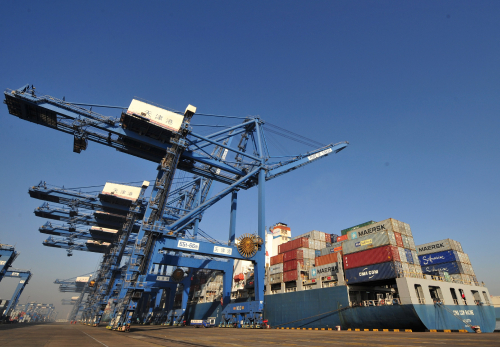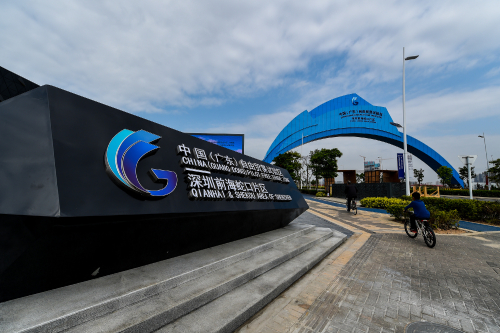|
 |
|
BUSTLING: Containers pile up at the Tianjin Port (ZHANG CHENLIN) |
Zijie Tiaodong Technology is a mobile Internet company headquartered in Beijing. Headline Today, a mobile news app developed by the company, boasts over 230 million users and is one of the most popular mobile apps in the country. In March, Zhang Yiming, founder and CEO of the company, made a decision to set up a research and development center as well as an operation center in Tianjin, a port city adjacent to the capital.
Zhang's decision followed the approval from central authorities to set up new free trade zones (FTZs) in the northern municipality, and in south China's Guangdong Province and southeast China's Fujian Province.
Following the success of the Shanghai FTZ, which was established in September 2013, the Central Government decided to expand the institutional innovation to a wider area. Successful experiences and milestones achieved by the Shanghai FTZ will be accessible elsewhere, and booming FTZs will become a new driving force for the slowing economy. However, in order to achieve differentiated development, the three newcomers should strive to find their own strengths.
Duplicating the success
An overall plan for three experimental FTZs in Guangdong, Fujian and Tianjin and expansion of the Shanghai FTZ were approved on March 24 by the authorities.
Experimental FTZs are important for exploring new paths and acquiring new experiences, a statement released after the meeting explained.
The statement said the Shanghai FTZ had made "positive progress" over the past more than a year, generating a model that can be replicated elsewhere. The new zones, as well as the Shanghai FTZ, will continue striving for institutional innovation, according to the statement.
Designed as a testing ground for further reforms, the Shanghai FTZ features lower thresholds for corporate establishment and liberalized foreign exchange. The zone also offers special benefits to certain industries, including e-commerce, legal services and logistics.
Liang Qi, Dean of the School of Economics with Tianjin-based Nankai University, said successful experience accrued in the Shanghai FTZ should be promoted across the nation, including the creation of an investment management system based on the negative list, a more convenient trading environment, a financial innovation system with the aim of yuan convertibility under the capital account and the opening up of financial services, and a transformation of government functions featuring present- and post-establishment supervision instead of pre-establishment approvals.
According to Chen Yin, Deputy Secretary General of Shanghai Municipal Government and former deputy director of the administrative committee of the Shanghai FTZ, 27 results concerning institutional innovation have been promoted either all over China or in specific areas of the country so far.
Another 28 policies, which have been successfully implemented in the FTZ to facilitate investment management, trade, finance and service industry development, is under final scrutiny of the State Council and will be promoted soon. Six other policies concerning institutional innovation in customs as well as inspection and quarantine will be duplicated and promoted in other areas in the country.
 |
|
ON THE RISE: The front gate of the Qianhai sub-zone of the China (Guangdong) Pilot Free Trade Zone (MAO SIQIAN) |
One of the biggest achievements of the FTZ is to make foreign investment in China easier by adopting the negative list.
A negative list is a management model for foreign investment that works by defining areas that are restricted for foreign investment. Foreign investments outside the list's scope do not require government approval and enjoy national treatment.
The negative list was derived from the United States. To date, over 70 countries have adopted this approach to managing foreign investment, and it has become a new trend in investment rules globally.
Upon its inauguration, the Shanghai FTZ adopted the negative list for the first time in China's history, so as to increase openness and transparency in foreign investment management. The 2014 version of the negative list of the Shanghai FTZ has been pared down to cover 139 areas, compared to 190 in 2013. Encouraged by this, foreign companies have flocked to the zone in large numbers.
In 2015, the three new FTZs will use the same list as Shanghai's, which is currently being formulated by the National Development and Reform Commission, China's top economic planner.
"The four FTZs will adopt the same negative list but the list will be slightly different," said Wang Shouwen, Assistant Minister of Commerce.
Sun Yuanxin, Vice President of the Free Trade Zone Institute of the Shanghai University of Finance and Economics, said those differences should be based on local conditions.
The negative-list approach is in line with the principle of "everything which is not forbidden is allowed." Gong Baihua, a law professor with Shanghai-based Fudan University, said China's negative-list approach has a long way to go to reach that ultimate goal.
"In terms of restrictive areas, the 2014 version negative list is not detailed enough, therefore some parts are very difficult to implement," Gong said.
Gong also suggested the list should be shortened. "As long as opening up a certain sector doesn't crush local industry or pose a threat to national security, it should be done," Gong said.
| 